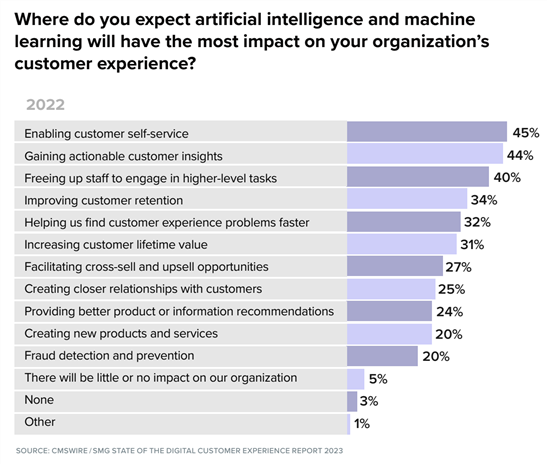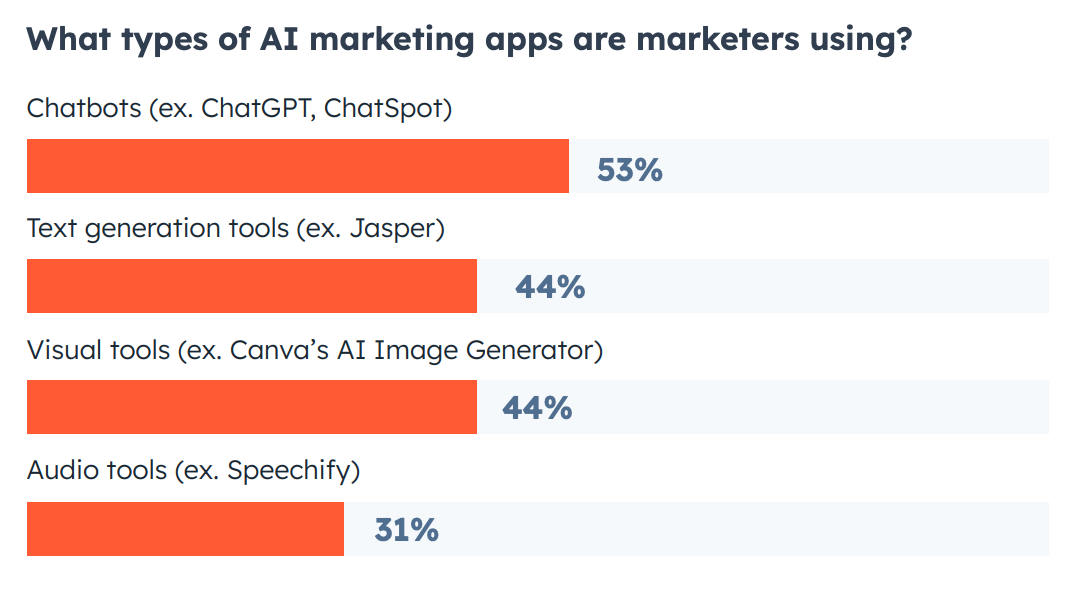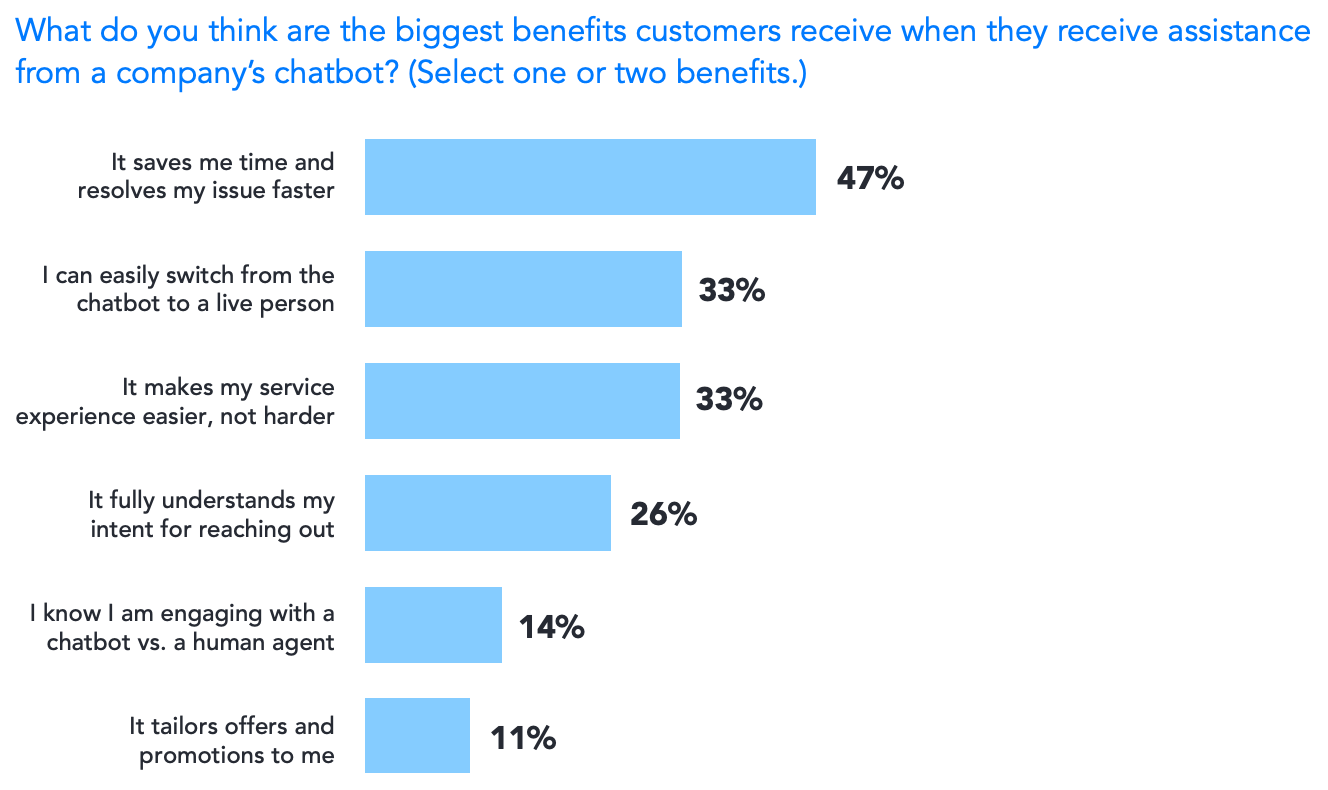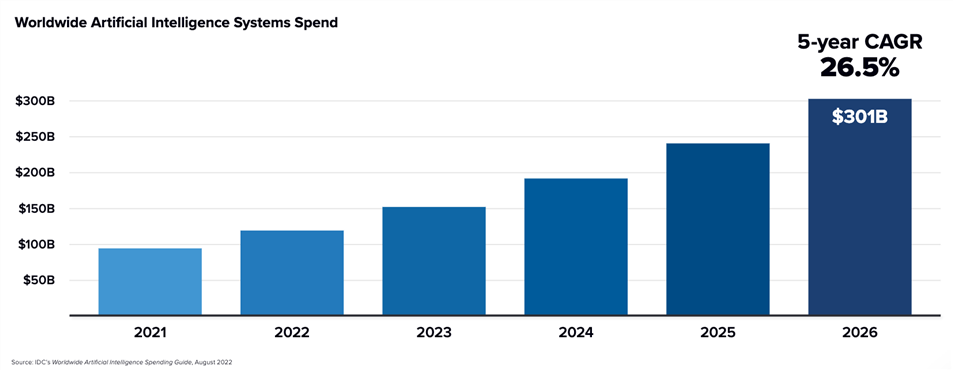The Gist
- Statistical insight. AI customer experience statistics reveal 96% of executives see generative AI as an accelerator, not a disruptor, in their boardroom discussions.
- Impact assessment. AI in customer experience is considered transformative by 60% of CX leaders, particularly in enabling customer self-service and providing actionable insights.
- Service revolution. AI in customer service is actively used by 63% of retail organizations to improve customer interactions, with 40% dedicating teams and budgets to the technology.
In a world where personalization and instant gratification have become the norm, leveraging technology to enhance customer experience is more critical than ever. The intersection of artificial intelligence (AI) and customer experience (CX) is reshaping how businesses interact with customers, giving rise to a plethora of insightful AI customer experience statistics.
In this article, we’ll dive into 10 pivotal AI statistics that illustrate the profound impact of the technology on customer experience.
96% of Execs Say Generative AI Is a Hot Topic in Boardrooms
Meaning, generative AI is “probably the fastest new technology to garner such high-level interest," according to Capgemini. And while 21% of executives anticipate a significant disruption in their respective industries, 61% disagree. That's because they don’t see AI as a disruptor — they see it as an accelerator.
The top types of AI platforms organizations find most useful and relevant to their businesses are:
- Chatbots: Automating customer service and improving knowledge management (83%)
- Data: Designing, collecting or summarizing (75%)
- Text: Summarizing, automating or translating (71%)
60% of CX Leaders Expect AI to Have ‘Transformative’ or ‘Significant’ Impact
CX leaders believe AI and machine learning technologies will make a big splash in the CX world over the next two to five years, according to CMSWire.

When asked where AI and machine learning will have the most impact within the organization, digital CX leaders said:
- Enabling customer self-service (45%)
- Gaining actionable customer insights (44%)
- Freeing up staff to engage in high-level tasks (40%)
Related Article: Turbocharging AI in Customer Experience for Growth
63% of Retail Organizations Use AI to Improve Customer Service
More than half of retailers are already using generative artificial intelligence to improve their current customer service offerings, says Capgemini. And 40% of organizations have already created dedicated teams and budgets for the technology.
US financial institution Morgan Stanley, for example, uses an internal generative AI-powered chatbot that helps employees access company knowledge. Using one platform, workers can find relevant knowledge from multiple sources.
81% of Contact Center Execs Are Investing in Agent-Enabling AI
“Contact centers continue to migrate to the cloud with the adoption of AI-enabled technologies to elevate the agent and customer experience,” according to Deloitte. Another goal of AI investments is to improve operational efficiency.
The majority of contact center executives surveyed (81%) have also invested in voice and text analytics — up from 62% two years prior.
95% of Marketers Who Use Generative AI for Email Rate It ‘Effective’
Marketers love generative AI for content creation, and email is no exception. Most marketers say the tech is effective, with 54% claiming it’s “very effective,” says HubSpot. And marketers that use generative AI to make content (of all types) save an average of 3+ hours per piece.

The top AI tools that marketers use include:
- Chatbots, like ChatGPT (53%)
- Text Generation Tools, like Jasper (44%)
- Visual tools, like DALL-E (44%)
AI Can Increase Self-Service Channel Use by 2-3X
McKinsey outlined one bank’s efforts to face increasing complaints, slow resolution times, rising cost-to-service and low uptake on self-service channels. The bank decided to revamp and improve its existing channels and processes with AI and automated service journeys.
The result was customers flocking to self-service channels. The bank also saw a 40% reduction in service interactions and more than a 20% reduction in cost-to-serve.
Related Article: 4 Self-Service Trends That Are Changing Customer Service
80% of Customers Expect Bots & AI to Improve Experiences
The majority of people believe interacting with a company’s AI-powered chatbot will come with at least one benefit, Verint reports. Only 20% of people surveyed said they think it would have no benefit.

The biggest benefits customers expect from interacting with a company’s AI-enabled chatbot are:
- It saves time and resolves issues faster (47%).
- It’s easy to switch from a chatbot to a live person (33%).
- It makes the service experience easier, not harder (33%).
92% of Workers Say AI Tech Has a Positive Impact
Nearly all workers surveyed say the artificial intelligence tools they have access to have a positive impact, according to Adobe — and 26% went so far as to call the tech a “miracle.” Nearly half (41%) agreed that “AI has completely changed how I work for the better.
The top reported productivity gains of AI include:
- Saving time (67%)
- Helping employees work faster (61%)
- Reducing or eliminating tedious work (45%)
Generative AI at Work Increases Productivity by 14%
One 2023 study looked at customer service workers with access to a generative AI chatbot. It found the tool had a positive impact on productivity when it came to the number of issues resolved per hour.
AI chatbots improved customer sentiment, reduced requests for managerial intervention and improved retention rates. One big benefit of the technology, according to the study, is that it helps capture the knowledge and behaviors of the top-performing employees and disseminates that information throughout the organization.
Global Spending on AI Will Pass $301B by 2026
In 2023, spending on AI is expected to cap out at around $150 billion, according to IDC. Yet organizations are just starting to realize how and where they put the tech to good use. By 2026, experts predict global spending on AI will surpass $301 billion.

The primary objectives businesses have for using AI include:
- Improve operational efficiency (39%)
- Improve customer experience (38%)
- Improve employee productivity (37%)
Related Article: AI in Decision Making: The Revitalization of Voice of the Customer
AI Customer Experience Insights Pave the Way
Looking at these stats, it’s clear — AI for customer experience is a game-changer. It’s shifting the way we interact, reshaping expectations and setting new standards in personalization and convenience. For businesses keen on staying ahead, these AI statistics are your compass, helping you navigate uncharted territories of consumer needs and expectations.
